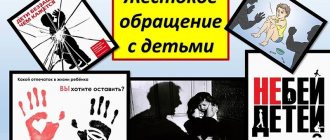The spread of threats of physical violence on social networks is far from a rare occurrence. Being away from his victim, the aggressor sometimes feels impunity and continues to poison the person’s life, intimidating him with his messages.
However, just like in real life, such behavior on the Internet is illegal and is punishable by law, including criminal punishment. The main legal act regulating liability for spreading a threat to human life and health (including on social networks) is Article 119 of the Criminal Code of the Russian Federation.
There is no separate regulation providing for punishment for spreading threats on the Internet.
Composition of the crime of threats via the Internet
A criminal threat is the intent of one person to cause serious harm to the health of another person or even take his life. This intention can be expressed verbally or in writing, supported by specific actions, gestures, and demonstration of objects that could potentially cause damage to health.
It doesn't matter whether the attacker actually intended to carry out his plans or not. The fundamental point is that the potential victim perceives the aggressor’s intentions as a real danger. Constantly being in anticipation of physical violence can cause an actual deterioration in the physical and psychological well-being of an individual.
When assessing the offender's statements, the relationship between the parties to the conflict, the circumstances in which the threat was made, the content of the threat and the frequency of its expression are taken into account.
Position of the Constitutional Court
The constitutionality of the described norm of the Criminal Code of the Russian Federation was repeatedly challenged by citizens (Determination of the Constitutional Court of the Russian Federation dated March 23, 2010 No. 368-О-О), but the Constitutional Court did not accept these complaints because they stemmed from a specific crime. However, the Constitutional Court provided the following clarifications in its definitions. Part 1 of Article 119 of the Criminal Code of the Russian Federation, which establishes liability for the threat of murder or infliction of grievous bodily harm, makes it possible to recognize as constituent in relation to the crime provided for by it only such an act that is committed with intent, aimed at the victim’s perception of the reality of the threat, when there are objective reasons to fear its implementation. This presupposes the need in each specific case of criminal prosecution to prove not only the existence of the threat itself, but also that it was deliberately expressed with the aim of intimidating the victim and in a form that gives reason to fear its implementation. The question of whether there were objective grounds for the victim to fear murder or serious harm to health requires an assessment of the factual circumstances of the case and does not fall within the competence of the Constitutional Court of the Russian Federation. (Determination of the Constitutional Court of the Russian Federation dated March 23, 2010 No. 368-О-О).
Peculiarities
From the point of view of the law, any threat is a crime, and there is a penalty for it. However, since on the Internet it is, in principle, quite easy to encounter manifestations of rudeness and hatred, including from anonymous ill-wishers, the main problems in bringing an aggressor to justice may be confirming the validity of the threats emanating from the criminal, as well as identifying his identity.
It must be proven that the aggressor, intimidating the victim and demonstrating his intentions to harm her life and health, did everything possible to ensure that his actions were perceived as a real danger. We talked more about what intimidation is and what punishment is provided for it in this material.
To confirm illegal actions, it is necessary to take a screenshot of the attacker’s post on a social network, since he can subsequently delete it. It is strongly recommended that the screenshot containing the threat be certified by a notary office. The notary must draw up an “Act of Inspection of a Page on the Internet.”
In addition, if, in addition to online intimidation, the victim receives face-to-face threats either directly from the attacker, or by telephone, or in the form of a letter, it is also advisable to record them: find witnesses and record the telephone conversation (details on what to do if threats are received by telephone read here).
Examples
- After a divorce, a woman systematically received messages from her ex-husband on one of the social networks threatening to disfigure her face. The reason for the divorce was the man's alcohol abuse. In addition, he was repeatedly prosecuted for beatings. Knowing the violent nature of her ex-husband, the woman had every reason to fear for her life and file a complaint with the police after receiving threats (you can find out where to go if your ex-husband threatens with violence, insults or stalks you here).
- On one of his posts, the man received a comment from an unknown person: “I would kill for such words!” Since the commentator did not express any other actions of his intention to commit a crime against the author of the post, due to the lack of reality of the threat being carried out, there is no corpus delicti.
Procedure
What to do if you are threatened on the Internet: on VK and other sites? If you receive a threat to life or health, you must immediately contact the police with a corresponding statement. Often the police do not show much activity in bringing the culprit to justice and limit themselves to explanatory conversations with him.
Important. Within the framework of the law, the victim can try to achieve justice by all legal means, in particular if the offender was not punished under Art. 119 of the Criminal Code of the Russian Federation, then you can try to recover compensation from him in court for moral damage caused (Article 151 of the Civil Code of the Russian Federation or 128.1 of the Criminal Code of the Russian Federation).
Algorithm
You need to file a complaint at the police station at your place of registration. There is no uniform standard for the application, but there are some requirements for its content. An approximate sample application can be obtained from the local police officer or downloaded from our website.
The application must state the situation as fully as possible, attaching supporting documents (screenshot of a message with a threat, etc.)
- After registering the application with the police, a pre-investigation check will begin, following which a decision will be made to initiate a criminal case or to refuse. The applicant has the right to familiarize himself with the decision and inspection materials.
- If a refusal is received, the victim can appeal the refusal decision by writing a corresponding statement addressed to the head of the investigative body, to the prosecutor's office, or by sending a statement of claim to the court. In this case, it is necessary to provide convincing evidence that the victim assesses the likelihood of unlawful actions being committed against him as very high.
Legal settlement
If the initiation of a criminal case was refused, but fears for life and health remain, the citizen has the right to send a statement of claim to the district court in accordance with the procedure provided for in Chapter 16 of the Criminal Procedure Code of the Russian Federation.
The statement of claim must contain:
- the name of the judicial authority where the plaintiff submits the application;
- Full name of the plaintiff and address of his place of residence;
- Full name of the defendant;
- the essence of the appeal is the presence of a threat to life and health;
- a detailed statement of the circumstances under which the threat was received;
- providing evidence confirming the fact of an unlawful act.
If necessary, you can contact specialized legal organizations that will help you competently draw up a statement of claim.
In order to convince the court, you need to provide significant evidence that there is a high probability of committing an illegal act. It is advisable to collect additional arguments to substantiate your concerns:
- testimony of witnesses who can confirm the opponent’s hostile attitude;
- certified screenshots on social networks and/or audio/video/photos and other materials containing the fact of a threat: recordings of telephone calls, SMS messages, letters (including emails), etc.
The state fee for filing a claim will be 300 rubles.
Judicial practice under Article 119 of the Criminal Code of the Russian Federation
Resolution of the Presidium of the Supreme Court of the Russian Federation dated December 6, 2017 N 224-P17
by the resolution of the senior investigator of the prosecutor's office of the ZATO city of Zelenogorsk, Krasnoyarsk Territory dated January 18, 2002 in relation to Fedorov, who was accused of committing crimes under clauses “b”, “c” .3 tbsp. 163, art. 119 of the Criminal Code of the Russian Federation, a preventive measure was chosen in the form of a written undertaking not to leave.
Resolution of the Presidium of the Supreme Court of the Russian Federation dated December 13, 2017 N 248P17
By the resolution of the Sretensky District Court of the Trans-Baikal Territory of November 8, 2012, a criminal case was opened on charges of Tonkikh under Part 1 of Art. 111, part 1 art. 119, part 1 art. 119 of the Criminal Code of the Russian Federation was returned to the prosecutor to remove obstacles to its consideration by the court. The preventive measure against Tonkikh in the form of detention was left unchanged.
Determination of the Judicial Collegium for Criminal Cases of the Supreme Court of the Russian Federation dated May 30, 2018 N 11-UD18-14
— July 14, 2014 under Part 1 of Art. 119 of the Criminal Code of the Russian Federation to 10 months of suspended imprisonment with a probationary period of 10 months, convicted under Part 1 of Art. 318 of the Criminal Code of the Russian Federation to 2 years in prison, under Part 2 of Art. 167 of the Criminal Code of the Russian Federation to 2 years in prison, under Part 1 of Art. 119 of the Criminal Code of the Russian Federation to 1 year of imprisonment; for the totality of these crimes by partial addition of punishments on the basis of Part 2 of Art. Criminal Code of the Russian Federation - to 2 years 6 months of imprisonment.
Appeal ruling of the Judicial Collegium for Criminal Cases of the Supreme Court of the Russian Federation dated 06/05/2018 N 18-APU18-6sp
KLIMENTOV Vladimir Filippovich, ... On October 30, 2009, convicted by the Korenovsky District Court of the Krasnodar Territory, taking into account the amendments made, under Part 1 of Art. 105 and part 1 of Art. 119 of the Criminal Code of the Russian Federation using Part 3 of Art. of the Criminal Code of the Russian Federation to 8 years 3 months of imprisonment, the sentence has been served in full (July 12, 2022),
Appeal ruling of the Judicial Collegium for Criminal Cases of the Supreme Court of the Russian Federation dated June 19, 2018 N 31-APU18-7
- 10.29.1999 according to clauses “a”, “d”, “d” part 2 of art. 117, art. 119, paragraph “b”, part 2, art. 213, part 5 art. of the Criminal Code of the Russian Federation to 19 years in prison; - November 29, 1999 under Part 3 of Art. , part 1 art. 313, Art. of the Criminal Code of the Russian Federation to 19 years 3 months of imprisonment (taking into account changes made by resolutions of 03/04/2005 and 06/04/2010) - to 17 years of imprisonment, released after serving the sentence on 07/28/2016, -
Resolution of the Presidium of the Supreme Court of the Russian Federation dated June 20, 2018 N 63P18
Convicted: under Part 1 of Art. 119 of the Criminal Code of the Russian Federation to 6 months in prison, under paragraph “c” of Part 2 of Art. 158 of the Criminal Code of the Russian Federation to 2 years 6 months of imprisonment, under Part 2 of Art. 167 of the Criminal Code of the Russian Federation to 2 years in prison, under Part 2 of Art. 162 of the Criminal Code of the Russian Federation to 5 years of imprisonment, under paragraphs “e”, “g”, part 2 of Art. 105 of the Criminal Code of the Russian Federation to 16 years of imprisonment with restriction of freedom for 2 years, with the establishment of the restrictions specified in the sentence, provided for in Art. of the Criminal Code of the Russian Federation - not to travel outside the territory of the municipal formation of the Sergievsky district of the Samara region, not to change the place of residence or stay without the consent of the criminal-executive inspection, which supervises the serving of sentences in the form of restriction of freedom by convicts, to appear there twice a month for registration.
Appeal ruling of the Judicial Collegium for Criminal Cases of the Supreme Court of the Russian Federation dated July 10, 2018 N 88-APU18-4
convicted under Part 1 of Art. 119 of the Criminal Code of the Russian Federation to 1 year of imprisonment, under clause “z”, part 2 of art. 105 of the Criminal Code of the Russian Federation to 16 years of imprisonment with restriction of freedom for 2 years, under paragraph “c” of Part 4 of Art. 162 of the Criminal Code of the Russian Federation to 9 years in prison.
Appeal ruling of the Judicial Collegium for Criminal Cases of the Supreme Court of the Russian Federation dated June 27, 2018 N 53-APU18-7
Convict Bobko A.M. does not agree with the verdict regarding his conviction for attempted murder, indicates that the court did not read out the testimony of victim A. given by him during the investigation. He denies the presence of intent and conspiracy to commit a crime. The aggravating circumstance was not documented; no examination was carried out in this regard. He supports his lawyer’s appeal and asks that his actions be reclassified under Art. 119 of the Criminal Code of the Russian Federation and reduce the sentence.
Appeal ruling of the Judicial Collegium for Criminal Cases of the Supreme Court of the Russian Federation dated June 27, 2018 N 59-APU18-4
- November 17, 2016 under part 1 of article 222, part 1 of article 119 of the Criminal Code of the Russian Federation with the application of articles, of the Criminal Code of the Russian Federation to 1 year 6 months of suspended imprisonment with a probationary period of 1 year 6 months; - February 20, 2022, under Part 2 of Article 228 of the Criminal Code of the Russian Federation, to 4 years of suspended imprisonment with a probationary period of 4 years,
Appeal ruling of the Judicial Collegium for Criminal Cases of the Supreme Court of the Russian Federation dated August 23, 2018 N 45-APU18-18
- July 8, 2014 under Part 1 of Art. 119 of the Criminal Code of the Russian Federation with partial addition on the basis of Part 5 of Art. Criminal Code of the Russian Federation with a punishment under the previous sentence of 1 year 3 months of imprisonment, released on October 6, 2015 after serving the sentence;
Appeal ruling of the Judicial Collegium for Criminal Cases of the Supreme Court of the Russian Federation dated 02/09/2018 N 1-APU17-12
By the resolution of the local police commissioner of police department N ... (for servicing the Oktyabrsky district of Arkhangelsk) of the Russian Ministry of Internal Affairs for the city of Arkhangelsk dated May 29, 2014, it was refused to initiate a criminal case based on a report of the commission of a crime under Art. Art. 119 and 163 of the Criminal Code of the Russian Federation, on the grounds of paragraph 1 of part 1 of Art. 24 of the Code of Criminal Procedure of the Russian Federation for the absence of a crime (vol. 3 case file 68).
Responsibility under Art. 119 for a threat via the Internet
The first part of Art. 119 provides for the following types of punishment for threats to kill or cause grievous bodily harm without qualifying criteria:
- compulsory work up to four hundred eighty hours;
- restriction of freedom for up to two years;
- forced labor for up to two years;
- arrest up to six months;
- imprisonment for up to two years.
The second part applies to threats made based on political, religious, or national hatred. In these cases, more serious penalties are provided, up to five years in prison.
Therefore, you should think carefully before making threats on VK and other Internet sites.
Commentary to Art. 119 of the Criminal Code of the Russian Federation
The object of the threat of murder or infliction of grievous harm to health consists of social relations that develop regarding the realization of the natural right of every person to life and health and ensuring the security of these social benefits. When threatened with murder, a threat of harm to relationships is created that ensures the safety of life and real harm to the health of the victim; when there is a threat of causing serious harm to health, the latter, on the one hand, is endangered, and on the other hand, it suffers real harmful consequences. Any person can be a victim, regardless of his age, state of health, ability to understand the meaning and significance of the threat and other circumstances.
The objective side is expressed in the form of active information actions - threats of murder or causing serious harm to health. The corpus delicti is formal; the consequences of the threat are outside its scope and do not affect qualifications. The crime is considered completed from the moment the threat is expressed or demonstrated, regardless of when it was perceived by the victim.
A threat is an informational impact on the victim’s psyche discovered externally and designed to intimidate the victim, expressing the subjective determination and intention of the perpetrator to cause death or serious harm to health. Methods of carrying out a threat can be different: verbal, written, gestures, through actions, etc.; a threat can be expressed, in particular, in the demonstration of weapons (clause 23 of the Resolution of the Plenum of the Supreme Court of the Russian Federation of December 27, 2002 No. 29 “On judicial practice in cases of theft, robbery and robbery”). What is common is the transmission of certain information about the socially dangerous intention of the subject.
A mandatory sign of a threat of murder or grievous bodily harm is its reality. To recognize a threat as real, it is necessary to establish that the perpetrator committed such actions that gave the victim reason to fear its implementation, and that the behavior of the perpetrator and his relationship with the victim objectively testified to the reality of the threat. The reality of the threat is established in each specific case, taking into account all the factual circumstances of the case. It is necessary to take into account both the objective criterion of reality (the method of expression, the intensity of the threat, the nature of the relationship between the perpetrator and the victim, the objective situation of the threat, the personality traits of the perpetrator, etc.), and the subjective perception of it by the victim as real.
The content of the threat is the expression of the intention to take life or cause serious harm to health. Responsibility for threats of other content (for example, threats to destroy property) in Art. 119 of the Criminal Code of the Russian Federation is not provided for; such threats entail liability only if they act as a method of committing another crime (for example, provided for in Article 163 of the Criminal Code of the Russian Federation). In cases where the perpetrator expresses threats of violence that are of an uncertain nature, the question of recognizing the person’s actions as a crime under Art. 119 of the Criminal Code of the Russian Federation, must be decided taking into account all the circumstances of the case: the place and time of the crime, the nature of the objects with which he threatened the victim, the subjective perception of the threat, the commission of any specific demonstrative actions, etc. .
———————————
By analogy with paragraph 23 of the Resolution of the Plenum of the Supreme Court of the Russian Federation of December 27, 2002 No. 29 “On judicial practice in cases of theft, robbery and robbery.”
The threat can be expressed either directly to the victim himself or through third parties. It is important that it is addressed to a specific person. Threats of murder or infliction of grievous bodily harm against an indefinite number of persons are not covered by Art. 119 of the Criminal Code of the Russian Federation, but under certain circumstances they can form part of another crime (for example, provided for in Article 282 of the Criminal Code of the Russian Federation).
The threat can be one-time or repeated. Repeated or systematic threats to kill or cause grievous bodily harm, addressed to one person and carried out with a single intent, do not form a set of crimes and are qualified as a single continuing crime. If a threat is addressed to two or more persons, the act is qualified as one crime, provided that such a threat expresses the single intention of the subject of the crime; otherwise, the offense is assessed taking into account the rules for qualifying the actual totality of crimes.
The subjective side of the crime in question is characterized by guilt in the form of intent. A person, possessing free will, when threatening to kill or cause serious harm to health, is aware of the socially dangerous nature of his act. The motive for the threat (except for that specified in Part 2 of Article 119 of the Criminal Code of the Russian Federation) does not matter for qualification.
For a correct criminal legal assessment, it is important to establish the purpose of the threat, since some of them, changing the content of guilt, may indicate the presence of a different crime (for example, a threat to kill in order to break the resistance of a rape victim). Qualifications according to Art. 119 of the Criminal Code of the Russian Federation is subject to a threat of murder or infliction of grievous bodily harm, which is not an element of the objective side of another, more serious crime (for example, rape, robbery, etc.).
The subject of the general threat is a sane individual who has reached the age of sixteen; persons aged fourteen to fifteen years are not responsible for this crime.
———————————
Determination of the Judicial Collegium of the Supreme Court of the Russian Federation in the case of Bochanov // Bulletin of the Supreme Court of the Russian Federation. 2000. N 5.
The qualifying sign of threat of murder or infliction of grievous bodily harm (Part 2 of Article 119 of the Criminal Code of the Russian Federation) is identical in its content to a similar sign of murder.
If the perpetrator, not limited to threats, commits other actions aimed at creating conditions for committing murder or causing grievous bodily harm, or directly aimed at committing these actions, responsibility arises for the preparation or attempt to commit crimes provided for in the relevant part of Art. 105 or art. 111 of the Criminal Code of the Russian Federation.
The threat of murder or grievous bodily harm may be an element of the objective side of another violent crime (for example, unlawful taking of a car without the intent of theft with the threat of violence). In this case, it does not require independent additional qualifications.
Article 119 of the Criminal Code of the Russian Federation contains a general rule on liability for threats of murder or infliction of grievous bodily harm. Along with it, the law also provided for special elements of threat (for example, in Articles 296, 318 of the Criminal Code of the Russian Federation). Emerging competition is resolved in accordance with the rules of Part 3 of Art. 17 of the Criminal Code of the Russian Federation.







